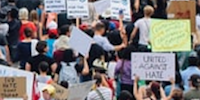William Ury
Director of the Global Negotiation Project, Program on Negotiation, Harvard Law School
Interviewed by Julian Portilla, 2003
This rough transcript provides a text alternative to audio. We apologize for occasional errors and unintelligible sections (which are marked with ???).
Q: So, let's take that in a contemporary context, and tell me about showing up in Venezuela and of course, using the sort of theoretical notion of the third side and trying to put it into flesh-and-bone in Venezuela.
A: Well, in talking about an on-going conflict you always have to be very cautious of ... Right now, the conflict in Venezuela is still very much in process, and that's the thing about these social conflicts - the conflict in Venezuela, most basically, is a conflict that people around the world are all facing, the world as a whole is facing, which is the problem of huge social inequities. You have a small class of people who have a lot and most people who have very little, and that's the problem the world faces as a whole. And that problem is being engaged in Venezuela and it's taking the form of a very vicious power struggle between President Chavez and his supporters and those people who are called Anti-Chavistas. So the country is effectively polarized between Chavistas and Anti-Chavistas.
When I first started working there a little more than two and-a-half years ago, there was widespread concern among international observers and inside Venezuela that this might lead to a civil war. And all they had to do was look across the border at Columbia and look what political violence there had done to turn that country into a whole series of interconnected wars, that have been really devastating. And so to me, what the real challenge was when I went down to Venezuela was to - I was really touched in the heart by the situation - was the possibility - because I've worked in situations like Yugoslavia and Sudan and other situations where the blood has already flowed, where millions of people have died, or hundreds of thousands. And always wondering, well, what could you do to try to anticipate these situations and prevent them, and Venezuela to me seemed to be very much in that situation. It was in a pre... not to say civil war was an inevitability, or even a probability, but definitely a possibility. Major, major social violence. And the question is, can you prevent it? Can it be prevented?
And in Venezuela, in a country that was deeply, deeply polarized, deeply divided - so that anyone who tried to be in the middle, as it were, was called a "Nini," neither on one side nor the other, and there was no space for them.
And there'd been a coup d'etat that had been reversed. So it was a very, very serious situation, so what I was invited to do by the Carter Center in the form of a friend of mine, Francisco Diaz from Argentina, was to come and offer a conference to seed the idea of the third side.
In Venezuela, it seems like there are only two sides; there can be no third side. And the third side, let me explain, is not neutrals, or not just neutrals - some neutrals may belong to the third side; it's really people who stand for the whole. Who stand for all Venezuela, who are concerned with, "how do we make a Venezuela that works for everybody - all sectors in society? How do we create a peaceful Venezuela?" One way to think about it is, "How do we create a Venezuela that's good for the children of Venezuela?" The third side is the side that stands for the whole, so just to see this idea of the third side that - and you can have Chavista sympathies or you can be an Anti-Chavista and still be on the third side.











